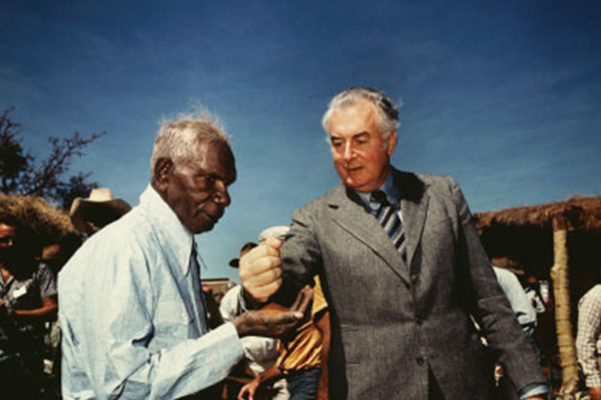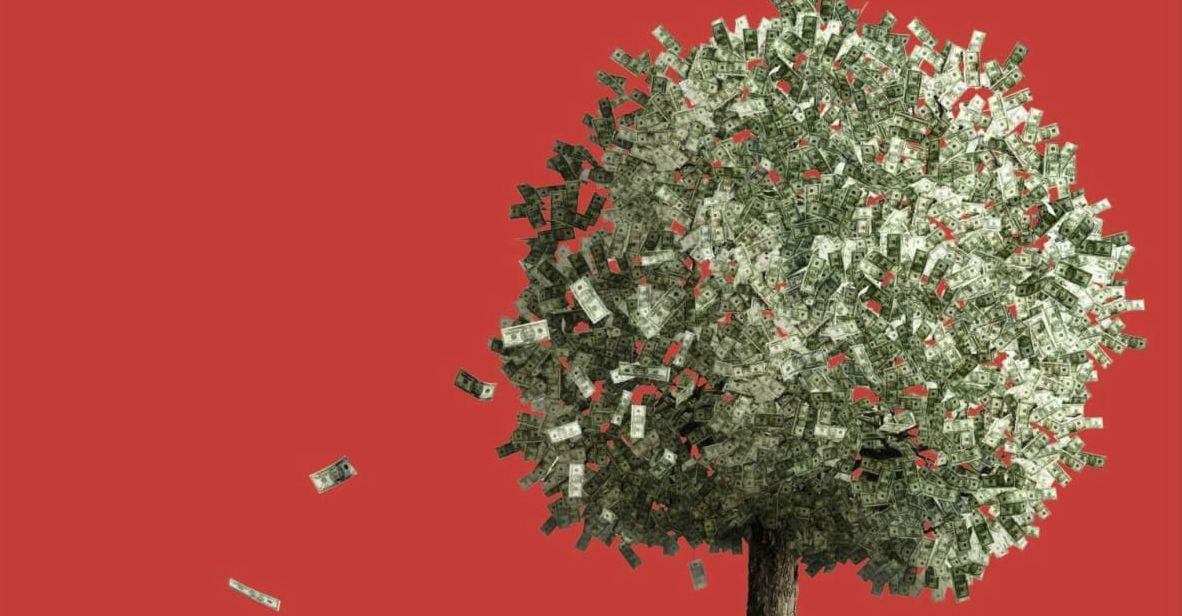 A handful of sand: the Gurindji struggle, after the walk-off – Charlie Ward (Monash University Publishing)
A handful of sand: the Gurindji struggle, after the walk-off – Charlie Ward (Monash University Publishing)
Australian politics offers few transcendent moments, but for many on the left, Gough Whitlam’s 1975 symbolic handover of land to Vincent Lingiari and the Gurindji people, captured in Mervyn Bishop’s iconic photograph, is one of them.
In A handful of sand, Charlie Ward goes beyond photogenic myth to tell a harder story about this famous land rights battle. It’s a tale of the hollowness of political promises, clashes between different levels of government, white ‘helpers’ of varying degrees of assiduousness, and differences of opinion between younger and older Gurindji about the kind of future they wanted to build. Particularly frustrating are the accounts of unrealistic goals foisted onto the Gurindji, which created ‘tensions between the elders’ modest goals [for their land] and the prescriptive demands of the state’.
Ward notes that the Gurindji were burdened by a ‘duty to succeed’ which lay heavily on their shoulders. As Hal Wootten has observed, ‘self-determination was supposed to be the choice of its subjects, yet … it was designed and conferred by the colonisers in terms of their own narrative.’ Great sadness pervades the book but there is hope here too. Ward is to be commended for his work – no people should be reduced to symbol.
 Testosterone Rex: unmaking the myth of our gendered minds – Cordelia Fine (Allen & Unwin)
Testosterone Rex: unmaking the myth of our gendered minds – Cordelia Fine (Allen & Unwin)
Psychologist Cordelia Fine takes us on a highly entertaining journey throughout the animal kingdom and the human world to unpick the dominant ‘story of sex and society’ which sees testosterone as the reason for alleged innate differences between men and women. For instance, she dissects the notion that men are primed for promiscuity owing to a need to produce multiple offspring to carry on their genes. As Fine points out, given that female humans are only fertile a few days each month, a man ‘would need to have sex with more than 130 women just to have 90 per cent odds of outdoing the one baby a monogamous man might expect to father in a year’. Think of all that wasted spermatozoa!
Although Fine interrogates assumptions about men’s innate sexual tendencies, sex work is mentioned only briefly and pornography consumption is not considered in any detail: possibly a missed opportunity, as the sex industry would seem relevant to some of the stereotypes she unpicks. Transgender men who take testosterone could presumably provide a first-hand account of its effects, and consideration of these experiences would also have been interesting.
Fine emphasises that humans are shaped not by biology alone, but also by our cultural and historical contexts, which combine to place barriers in the way of a more equal world. She notes: ‘If you want a male rat to take care of a baby rat, you pop him in a cage with one.’ The goal of ‘rearranging gender in the human developmental system’ unfortunately remains considerably more complicated.
 The Vagabond Papers (edited and introduced by Michael Cannon) – John Stanley James (Monash University Publishing)
The Vagabond Papers (edited and introduced by Michael Cannon) – John Stanley James (Monash University Publishing)
This collection of the columns of John Stanley James, who wrote under the pseudonym ‘the Vagabond’, provides a compelling documentary picture of late-nineteenth century Melbourne and Sydney, replete with stark inequality, ragged children selling matches, slums, booze, gambling, ‘brutalizing’ football matches, and sausages that are ‘bags of mystery’.
The vivid columns, which are reminiscent of some of George Orwell’s work, are (given the era) sprinkled liberally with racism and sexism, and the Vagabond also appears frankly disappointed that the ‘hard labour’ served in Pentridge Prison was simply not hard enough. Issues are also often reduced to the individual level, as in the observation that ‘the forces of society work against the weak’. However, there is compassion here for those unlucky enough to be reliant on the uncertainty of charity, and implicit condemnation of the political order that tolerated this grim state of affairs.
 Why the Future is Workless – Tim Dunlop (New South Books)
Why the Future is Workless – Tim Dunlop (New South Books)
This unsettling book discusses the prospect of robots taking our jobs, rejecting arguments that we should either let the market solve the problem of increasing automation or (more contentiously) attempt to return to full employment. Instead, Dunlop concludes, we must embrace a postwork future.
A strength of the book is that as well as looking at affluent nations it considers the lot of workers in the global south, including the millions of children pressed into underage labour: there are places where slavery, rather than ‘bullshit jobs’, is a major problem. Dunlop’s analysis of the flaws inherent in the ‘gig economy’ (on which I’d also recommend this pithy piece by Jia Tolentino) is solid and detailed. Workless also considers universal basic income proposals, with Dunlop observing correctly that ‘as a concept … basic income is being asked to do a lot of work’, although he does not engage substantively with left critiques of these proposals.
The book ends on a note of hope. I was left wondering what overriding ethos might replace work as ‘our source of worth and meaning’ in a postwork world, but it’s unfair to ask a wide-ranging book such as this to provide all the answers; it certainly explores timely questions.
 Unstable Relations: Indigenous People and Environmentalism in Contemporary Australia – Eve Vincent and Timothy Neale (eds) (UWA Publishing)
Unstable Relations: Indigenous People and Environmentalism in Contemporary Australia – Eve Vincent and Timothy Neale (eds) (UWA Publishing)
Recent years have seen fiery debates about conflict between conservationist and Indigenous rights-based approaches to land. For instance, Marcia Langton’s 2012 Boyer Lectures charged that ‘on the left’ there was ‘an unspoken expectation … that no Aboriginal group should become engaged in any economic development.’ Unstable Relations moves beyond polemic, although it is unfortunate that the majority of its authors are non-Indigenous.
Stephen Muecke’s account of Indigenous-Green knowledge collaborations in the campaign against the ill-fated proposal for a gas hub at James Price Point was absorbing but somewhat troubling. The essay seems to casually dismiss the Jabirr Jabirr native title claimants’ no doubt difficult decision to enter into an agreement over the project. For Muecke, Aboriginal opponents of the gas hub were ‘prepared to fight to the bitter end’ to maintain traditional law and culture, ‘while other Indigenous groups in Broome battled for … compensatory benefits’: a rather simplistic binary.
Overall the essays are nuanced and clarifying. Several pieces stand out: Timothy Neale’s valuable analysis of the controversy surrounding the Wild Rivers Act 2005 (Qld); interviews with Monica Morgan, Dave Sweeney and Anthony Esposito; Robert Levitus’ exploration of the contested notion of ‘wilderness’ (an extremely loaded term in settler societies); and Eve Vincent’s fine-grained stories of interactions between ‘environmental culturalists and Aboriginal greenies,’ which cover everything from issues of white guilt and privilege to the awkwardness non-Indigenous vegetarians can feel around the campfire while traditional owners eat kangaroo tails.
Feature image: Vincent Lingiari and Gough Whitlam – A handful of sand (cover detail)



